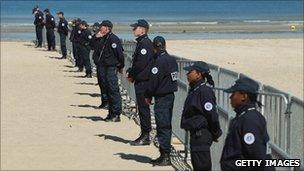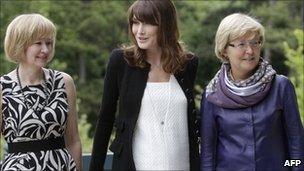G8 summit: Arab uprisings dominate Deauville agenda
- Published
- comments

Security is tight in the French seaside resort of Deauville
World leaders are in the French resort of Deauville for a summit of the G8 bloc of wealthy nations.
The leaders are discussing how to end the seemingly deadlocked Libya conflict, and their response to the revolutions in Egypt and Tunisia.
Correspondents say recent events such as uprisings in the Arab world and Japan's nuclear crisis have given the G8 a new sense of purpose.
Also on the agenda is how little or how much the internet should be regulated.
Internet bosses - including Facebook founder Mark Zuckerberg and Google boss Eric Schmidt - are attending the two-day summit in Normandy.
The global economy and climate change will also be discussed at the gathering for the leaders of the US, Russia, the UK, France, Germany, Italy, Japan and Canada.
As the summit opened, the French and Russian leaders met to agree the sale of four French-built Mistral helicopter carriers to Russia at a cost of at least 400m euros each (£350m; $565m).
The elements of the deal had been agreed and "the signature will take place within a fortnight", French President Nicolas Sarkozy said.
The deal - Russia's biggest foreign arms purchase since the fall of the Soviet Union - has caused consternation among some of Russia's neighbours and some of France's Nato allies.
Nuclear debate
Thousands of police have been deployed as part of a huge security operation and checkpoints have been erected on all roads leading to Deauville.
In drizzling rain, President Sarkozy welcomed his guests to the coastal casino resort as they were heralded by trumpets.
His wife, Carla Bruni-Sarkozy, is hosting the leaders' spouses and greeted them in a white dress that showed off her pregnancy.
US President Barack Obama, who headed to the meeting after a state visit to the UK, is holding a series of one-on-one meetings with leaders including President Sarkozy and Japanese Prime Minister Naoto Kan.

Mrs Bruni-Sarkozy greeted the leaders' spouses in a dress that showed off her pregnancy
He has already met Russian President Dmitry Medvedev for discussions over the two countries' long-running row over US plans to create a missile defence shield in central and eastern Europe.
President Obama told reporters that the two men were committed to finding an approach that met the security needs of both countries, while Mr Medvedev said the two could work together towards a resolution, but it was unlikely to come in the near future.
Debate is expected at the summit on ways of improving global nuclear safety after the breakdown of Japan's Fukushima power plant following March's earthquake and tsunami.
G8 also offers the leaders their first real opportunity to debate the so-called Arab Spring uprisings.
Interim prime ministers from Tunisia and Egypt - where longtime leaders were overthrown this year - and the head of the Arab League will also be at Deauville for talks on a massive aid plan to help their transition to democracy.
Representatives from the World Bank and the International Monetary Fund are due to spell out for G8 leaders what it would take to stabilise the Tunisian and Egyptian economies.
But the ongoing global financial crisis will determine what concrete help can be offered and correspondents say large pledges are unlikely.
Points of friction
BBC diplomatic correspondent Bridget Kendall, in Deauville, says that despite President Obama's appeal in London on Wednesday for democratic unity and leadership, there may well be friction at the summit.
She adds that Russia's president - one of the first to arrive - has opposed air strikes on Libya from the start, though he may offer to mediate in that conflict.
Africa will also be represented at the summit, as it has been since 2003. Newly elected leaders from Ivory Coast, Niger and Guinea are expected to participate in sessions about promoting democracy.
A shift in global influence to emerging powers such as India and China, who are not in the G8, has led to the bloc's relevance being questioned.
But speaking in London on Wednesday, President Obama rejected arguments that the rise of superpowers like China and India spelled the demise of American and European influence in the world.
After the summit ends on Friday afternoon, President Obama is scheduled to travel to Poland, the last stop on a four-country, six-day tour of Europe that began on Monday in Ireland.
- Published25 May 2011
- Published25 May 2011
- Published26 May 2011